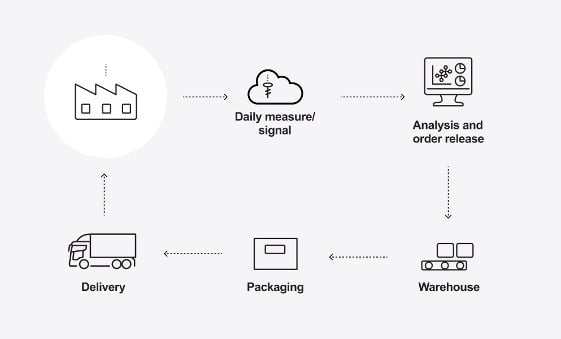- Insights
- The Solutionists Hub
- Supply Chain Strategy; Why, what, and how?
Supply Chain Strategy; Why, what, and how?

I hear different types of supply chain strategies from various companies and industries. I think it's an exciting topic to discuss, as it severely impacts your chance to achieve your overall business objectives. A well-formulated supply chain strategy will help you achieve your overall business objectives.
In this text, I'll go through why supply chain strategy is essential, what it is and how to develop it. At the end of the article, you can take the next step and download the guide about implementing a seamless supply chain of C-parts.
Why is supply chain strategy important?
Your supply chain refers to the network of suppliers you rely on to produce and distribute your products, solutions, or services—everything from moving and transporting raw materials to how you distribute them to your customers. These activities contribute to a large part of your operational performance and overall costs. Thus, it's critical to have a strategy on how you manage your supply chain.
What is a supply chain strategy?
A supply chain strategy describes the plan of actions for your supply chain to achieve the overall business objectives. Your strategy shall serve as a basis for decision-making for everyone working directly with supply chain management.
Most companies that I work with are committed to effectiveness and cost optimization. For me, it's obvious that most manufacturers strive to reduce lead times, secure a constant supply of components, reduce inventory costs and ensure high-quality.
Examples of supply chain strategies
To give you some inspiration on how your supply chain strategy can support your overall business objectives, I'll share some notions:
Business objective: Cost-leader
If your company has the business objective to become the cost leader in your market, you need to reduce the supply chain costs. But if you try to source cheaper items, you might get lower quality. If you don’t want to compromise on quality, the best way to reduce costs is to review the TCO (total cost of ownership). By reducing the number of suppliers and items, and partnering with one or a few preferred partners globally you can reduce procurement costs significantly and reach a lower TCO.
Business objective: Sustainability
One of your business objectives is probably to become more sustainable. Then, having a supply chain strategy to reduce transportations will help you achieve it. The next step would be to not only audit, but to influence your suppliers to improve on sustainability, a task I from experience know is not a self-playing piano.
Business objective: Customer experiences
Do you have a business objective to increase the customer experience? Reducing delivery time is one example of how a supply chain strategy can support that. Consistent and purposeful quality control near the source is yet another strategic advantage.
How to develop a supply chain management strategy?
In my experience, your supply chain strategy should be formulated by a combination of individuals who are well aware of your overall business objectives. My advice to you is to gather representatives from your executive team and the decision-makers working with supply chain management.
A good start is to identify how your supply chain is supporting your business objectives today, by asking these questions:
- Are there any misalignments?
- What are the strengths and weaknesses of your current supply chain?
By answering these questions, you'll get a clear overview of what is missing.
Ultimately, make sure that each of your business objectives has support from your supply chain strategy.
Get the Guide to a Seamless Supply Chain of C-Parts
If you're interested in knowing how I help companies implement their supply chain strategy related to C-parts, I recommend you download the guide below.
This guide explains a seamless supply chain of C-parts, why it's essential, and how to achieve it.
Get new knowledge every week!
Related
-
By Niklas LindsköldHow do EU sanctions against Russia affect your C-parts operation?
-
By Jaroslaw BazeliSupply Chain Strategy Definitions You Should Know
-
By Slawomir BieszkSupply Chain Management Risks, and How to Handle Them
-
By Nick MilesDefining the Objectives of C-Parts Supply Chain Management
-
By Rob KoningsHow Does the C-Parts Supply Chain Management Process Work in Practice?
-
By Jacob BergströmSupply Chain Challenges and How to Overcome Them
-
By Sergio BrambilaSustainable Supply Chain: How to Reduce Your Carbon Footprint
-
By Jacob BergströmSupplier vs. Supply Chain Partner: What to Choose?










